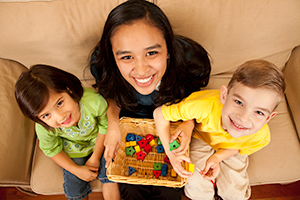Q&A: What Does the Babysitter Need to Know About ADHD?

Question: I’ve recently been hired to babysit a child after school. My new kiddo has been diagnosed with ADHD. I don’t know very much about taking care of a child who has ADHD and I’m not sure what I actually need to know.
Health Information Specialist: It’s important that all the adults in a child’s life be on the same page when it comes to ADHD, treatment, routine, and family expectations. As a babysitter or child care provider, you are a member of this team and can be a vital part of the family’s support system.
Your kiddo’s parents are the best source of information about this particular child’s needs. Some things you may want to ask:
- Will I be responsible for administering any medications for this child?
- Are there any specific foods I should be sure to include in snacktime or any foods or ingredients I should avoid? Some children, regardless of ADHD, have food sensitivities that can affect their behavior.
- What routines or schedule will this child follow?
- Are there any incentives or consequences for certain behaviors? What are those behaviors, both positive and negative? How do I implement those incentives or consequences in a way consistent with the parent’s goals?
What child care providers need to know about ADHD
Most people have heard a little bit about ADHD, but there are several misconceptions some people may have. It’s important to become familiar with ADHD. Our Frequently Asked Questions about ADHD can help you learn more.
Child care providers, including daily after-school care providers and occasional babysitters, should be familiar with the symptoms of ADHD and how those symptoms can affect children’s behavior. You can learn more about the basics of ADHD at About ADHD and Treatment for Children.
When taking care of a child affected by ADHD, you should also be aware of the following:
- Children affected by ADHD are often very active and impulsive. They may not pay close attention to what they are doing and don’t always think through the possible consequences of their actions. Because of these traits, they have a greater chance of getting hurt while playing. On the other hand, exercise can be helpful for increasing attention and improving behavior when playtime is over. You may want to plan adventures that allow for creativity and active play in locations that also allow children to run and tumble without much risk of injury.
- Be specific with the directions you give the children you care for. You may need to break the directions into separate steps, with only one or two steps at a time. For some children, you may be able to give them a written checklist to work from.
- Many children affected by ADHD have difficulty switching from one activity to another. Ask the child’s parents what method works best for transitions and follow that as closely as you can. Often, giving children advanced notice of an activity change (such as, “In 10 minutes, we will go to the park,” or “There are five minutes left to play this game”) can help with transitions. For some children, a small transition activity between two bigger activities can help serve as a “cool down” shift.
Tips for child care providers
What else can help you provide care for a child affected by ADHD?
- Remain calm with the child, even if she is unruly or has a temper tantrum. Children affected by ADHD often experience their feelings in a way that is overwhelming for them and have difficulty controlling such feelings. Remaining calm and giving time for the episode to pass helps the situation to de-escalate more quickly and move on to dry eyes sooner.
- Have reasonable expectations for the child. Keep in mind that children affected by ADHD often act younger than their ages and have more trouble following directions and staying on task.
- Follow the family’s routines or create ones for the child while in your care. When children know what to expect and when, they are often better able to behave and work through transitions.
- Have a plan—or several back-up plans—for when the child is having trouble managing behaviors. You might want to talk with his parents ahead of time for agreed upon plans, rewards, or consequences if there are difficulties.
- Make sure to plan quiet time, especially if you are also getting the child ready to go to bed. ADHD can interfere with sleep, and many families follow bedtime routines to help prepare children to sleep. Turning off TVs and electronics at least 30 minutes before bedtime can help, along with reading books or drawing and coloring.
Looking for more?
Additional resources regarding child care for children affected by ADHD:
- ADHD and Childcare
- Frequently Asked Questions about ADHD
- Homework Help: Creating a Homework Space
- Caring for a Child with ADHD or ADD: Advice for families and caregivers
- Tips for caring for children who have ADHD
Do you have a question about ADHD? Talk with a health information specialist, Monday-Friday, 1-5 p.m., at 866-200-8098 or talk with other parents in our on-line community ADHD Parents Together.
